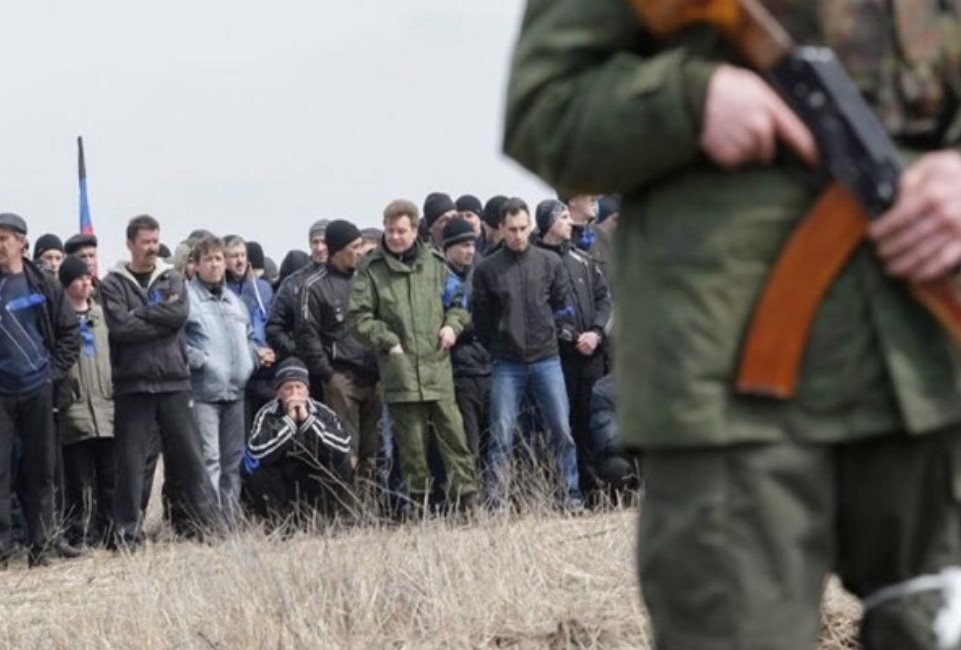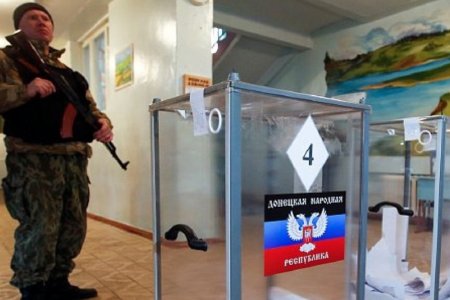
Russia is not letting Ukrainian men leave occupied territory, with this just one of many reasons why human rights defenders warn of plans to forcibly mobilize Ukrainians to fight its war of aggression against Ukraine. Most chillingly, even 17-year-olds are held hostage in this way, with the invaders clearly just waiting for them to turn 18 when they can be ‘forced to volunteer’ to fight.
The Eastern Human Rights Group reported in early March that Russia had been stepping up measures over the previous month to mobilize young Ukrainians on occupied territory as soon as they turn 18. Russia’s occupation administrations were holding 16-17-year-olds under scrutiny, so that they did not slip through their need, in this way essentially creating a conveyor belt of new fighters. All educational institutions have received orders to prepare lists of all those fit for the army from the age of 16.
Since December 2022 the invaders or local collaborators have also been actively gathering information about all those remaining on occupied territory, and handing those that they could forcibly mobilize over to the so-called military recruitment offices. Students who have turned 18 are not safe either, with Russia essentially forcing them to sign contracts and sending them to the front. Since the beginning of Russia’s full-scale invasion, it has either cancelled medical examinations of conscripts altogether, or has made them a mere formality, so that nobody can avoid being called up on health grounds.
Russia’s Spring conscription began on 1 April. Although at present, this is officially carried out only in occupied Crimea, human rights defenders warn that the Russians are planning to carry out conscription on all occupied territory Pavlo Lisiansky, Director of the Institute for Strategic Research and Security, says that his organization and the Eastern Human Rights Group regularly receive information that the Russians are planning such conscription.
Local residents express concern about Russia’s raising of the maximum age for ‘volunteers’ from 55 to 60. They understand, Lisiansky notes, that there is no such thing as ‘voluntary’ signing up.
There has long been concern that Russia was staging its fake ‘referendums’ and claiming that occupied parts of the Donetsk; Luhansk; Kherson and Zaporizhzhia oblasts had ‘become part of the Russian Federation’ to gain new cannon fodder for the war. While the Russians are being careful to claim that Ukrainians join the Russian forces, mercenaries, etc. as ‘volunteers’, there was nothing at all voluntary about the rounding up of men in occupied Donbas from February 2022, and it is hard to believe that Russia will not use coercive measures against those about to turn 18.
Confirmation of this can be found in the very active measures now underway to foist Russian citizenship on Ukrainians in occupied territory. The Ukrainian authorities have long warned men to leave if they can and to avoid taking on Russian citizenship, but many are essentially given no choice (with threats of dismissal used, of having their children taken from them, etc.) The danger is enormous as once Russia can claim Ukrainians to be its ‘citizens’, they will be liable to any decrees, etc. on mobilization.
Collaborators installed in occupied parts of the Kherson and Zaporizhzhia oblasts have announced the creation of a supposed ‘volunteer force to defend the oblasts”. These are, Lisiansky explains, ‘volunteers’, as opposed to contract soldiers, but that does not mean that they joined such a force voluntarily. With respect to students, for example, “they were forcibly registered as volunteers. They were effectively subjected to forced mobilization, sent to the front and forced to sign that they had voluntarily agreed to this. They then have the status not of a military serviceman, but of a volunteer. The social guarantees which Russian servicemen of the occupation army enjoy do not apply to such volunteers. That is the difference.”
Lisiansky points out that the contract soldier system is not fully functional on occupied territory simply because Russia has yet to establish what it will claim are ‘legitimate bodies of power’. This, it plans to do, on any territory not yet liberated, via illegal ‘elections’ on 10 September 2023. Until then, there will remain the pretence about ‘volunteers’ forcibly sent to the front.
All mobilization, whether open or covert, is in grave violation of international law, and information about all such crimes, like those committed through Russia’s application of conscription in occupied Crimea since 2015, are passed to international bodies, including the International Criminal Court [ICC]. Lisiansky points out that the work of Ukrainian human rights groups was of major importance in ensuring the first arrest warrants issued by the ICC against Russian President Vladimir Putin and his so-called commissioner on children’s rights Maria Lvova-Belova over the deportation of Ukrainian children to Russia. He anticipates that analogous actions will be taken by the ICC over Russia’s forced mobilization.



